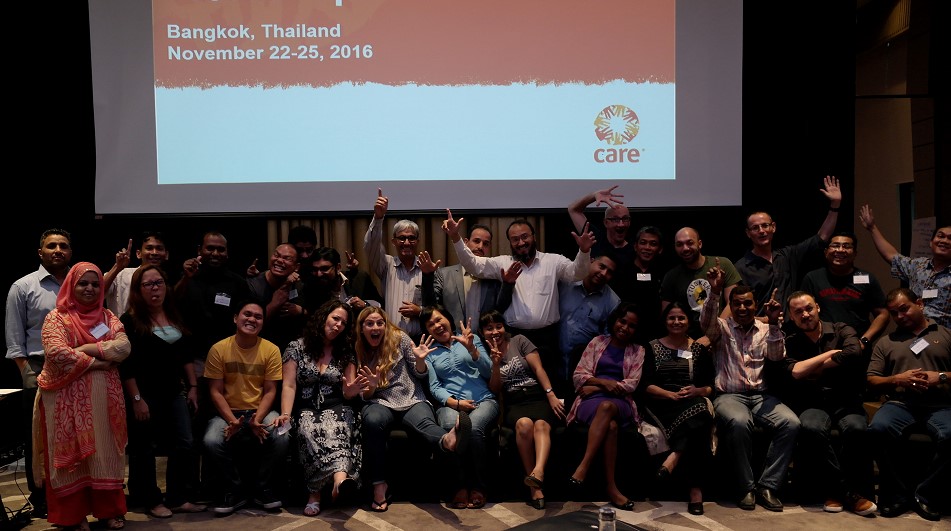DISASTER RESPONSE

CARE’s Asia Pacific Regional Unit, in Bangkok, Thailand organised an Asia Pacific Regional Supply Chain Workshop for Program Support and Program Team Members of the region from 22-25 November 2016. A total of over 20 participants attended the workshop, which was convened by Logistics Manager at Emergency and Humanitarian Assistance, Ms. Rachel Gordon-Roberts, who is also working with CARE Emergency Group and ARMU at Regional Level. Navaraj Gyawali, Regional Director, Asia Regional Management Unit, CARE International (ARMU) delivered opening remarks and wished that the workshop can attain the desired outcome.
The Workshop was targeted at Program Support and Program Team Members involved in procurement, logistics, distribution function, and was particularly aimed for mid-level teams. The facilitators introduced the role of supply chain in humanitarian operations and different services rendered by CARE. The initial sessions of the workshop also helped the participants to understand CARE’s Humanitarian Supply Chain Management as well as identify the key competencies within the Supply Chain.
It was an enriching experience to attend the Asia Pacific Regional Supply Chain Workshop, which served as a great platform for interacting with many international colleagues, who are veterans and specialists in Supply Chain Management and its associated disciplines.
The workshop was very well organized and turned out to be a great success in imparting knowledge and key learnings to the participants. Four day stay for the workshop was an learning experience, with active involvement and participation in several activities and discussions. The workshop also provided me with a platform to bring forward the logistical and operational challenges that may stand as a road block in undertaking the Emergency Response Activities. Also, the various measures taken by CARE India in response to overcoming these challenges during the Uttarakhand Floods (2013) and Nepal Earthquake(2015) were shared with the participating members, thereby demonstrating the potential capabilities and state of readiness of CARE India in effectively responding to any disaster.
CARE India, as a front-runner at Emergency Preparedness Planning.
For CARE, emergency preparedness encompasses all aspects of disaster risk management—from addressing underlying causes to responding in times of emergencies. First and foremost, preparedness must focus on prevention and mitigation—taking pre-emptive measures to help communities avoid emergencies and become better equipped so that the impact of disasters is reduced. Since some risks cannot be completely mitigated, Country Offices are expected to always remain in a state of readiness to respond to crises and shall adhere to some of the basic principles of Emergency Preparedness. As a matter of fact, it was noteworthy to see that CARE India emerged as one of the front-runners when it comes to meeting the basic standards and requirements of Emergency Preparedness – viz Emergency Roster with Skilled Staff on-board, Strong Networking and Partnership with the Local NGOs, Master Contracts with Supporting Vendors, to mention a few.
Focus Areas of Responsible and Dedicated Program and Program Support Members.
The subsequent sessions of the Workshop were engaged at drawing the attention of the participants towards their key Roles and Responsibilities in Supply Chain Management. To provide a transparent and accountable Supply chain from the donor to the beneficiary was highlighted as the Primary Role for the dedicated members, at the same time it was also identified that provision of infrastructure for the delivery of programs must be given due consideration and should therefore be safe and effective to achieve desired results.
The Six R’s Methodology:
Supply Chain Management, is not only restricted to efficiently planning and control of the flow of goods and materials through an organization or manufacturing process but should be primarily aimed at supporting the Project Mission by facilitating the Program Delivery which can be achieved by getting the following 6 R’s in place:
RIGHT Quality
RIGHT Quantity
RIGHT Time
RIGHT Price
RIGHT Source
RIGHT Place
At the end, I would like to express my heart-felt gratitude to the organisers, who were instrumental in the smooth conduct of the workshop over a period of four-days.




